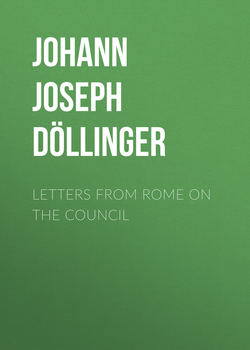Читать книгу Letters From Rome on the Council - Johann Joseph Ignaz von Döllinger - Страница 2
Views of the Council. (Allgemeine Zeitung, May 20, 1869.)
ОглавлениеCardinal Antonelli is said on good authority to have replied very lately to the question of the ambassador of a Northern Government, that it is certainly intended to have the dogma of Papal Infallibility proclaimed at the ensuing Council; and, moreover, as this has long been the belief of all good Catholics, that there would be no difficulty about the definition. It by no means follows, if this report is correct, that the importance of the new principle of faith to be created is not well understood at Rome. The Civiltà Cattolica leaves no room for doubt that one of its principal effects is already distinctly kept in view, and that a further principle, which again must involve an indefinite series of consequences, is being deliberately aimed at.2 In the number for April 3, it has spoken with full approval, with reference to the approaching Council, of the famous Bull of Boniface viii., Unam Sanctam, doubly confirmed by Papal authority, and addressed as a supreme decision on faith to the whole ecclesiastical world, and treats it as self-evident that all the contents of the Bull, with other doctrinal decrees issued throughout the Church, will come into full force after the Council, and thenceforth form the basis of Catholic doctrine on the relations of Church and State. The maxims that will have to be adopted, as well by the learned as in popular instruction, when once Papal Infallibility has been defined, are these: —
The two powers, the temporal and spiritual, are in the hands of the Church, i. e. the Pope, who permits the former to be administered by kings and others, but only under his guidance and during his good pleasure (ad nutum et potentiam sacerdotis). It belongs to the spiritual power, according to the Divine commission and plenary jurisdiction bestowed on Peter, to appoint, and, if cause arise, to judge the temporal; and whoever opposes its regulations rebels against the ordinance of God.
In a word, the absolute dominion of the Church over the State will next year come into force as a principle of Catholic faith, and become a factor to be reckoned with by every Commonwealth or State that has Catholic inhabitants; and by “Church” in this system must always be understood the Pope, and the Bishops who act under absolute control of the Pope.
From the moment therefore when Papal Infallibility is proclaimed by the Council, the relations of all Governments to the Church are fundamentally changed. The Roman See is brought into the same position towards other States which it now occupies towards Italy in regard to the provinces formerly belonging to the States of the Church. All States find themselves, strictly speaking, in an attitude of permanent revolt against their lawful and divinely ordained suzerain, the Pope. He indeed on his side can and will tolerate much which properly ought not to be – for it has long been recognised in Rome that right, even though divine, by no means implies the duty of always exercising it. In numberless cases silence will be observed, or some such formula adopted as that of the Austrian Concordat, art. 14: “Temporum ratione habitâ Sua Sanctitas haud impedit,” etc. But that must only be understood “during good behaviour,” or so long as the times do not change or it seems expedient. In conscience every Catholic is bound to be guided, in the first instance, in political and social questions, by the directions or known will of his supreme lord and master the Pope, and of course, in the event of a conflict between his own Government and the Papal, to side with the latter. No Government therefore can hereafter count on the loyalty and obedience of its Catholic subjects, unless its measures and acts are such as to secure the sanction, or agreement of the Pope. As to non-Catholic Governments, moreover, the former declarations of Popes against heretical princes, which receive fresh life from the dogma of Infallibility, come into full force. If it is already a common complaint that in countries where the Government or the majority are Protestant, Catholics are treated with suspicion when they take any part in the service of the State, and are purposely excluded from the higher and more important posts, how will this be after the Council?
2
The weight to be attached to the Civiltà on all questions connected with the Council may be gathered from the Brief of Pius ix. of Feb. 12, 1866, printed in the Civiltà, Serie vi. vol. vi. pp. 7-15. The Pope declares that this journal, expressly intrusted with the defence of religion and with teaching and disseminating the authority and claims of the Roman See, is to be written and edited by a special staff to be named by the General of the Jesuits, who are to have a special house and revenues of their own. The previous censorship, as is known in Rome, is exercised with particular care, so that nothing appears without the approbation of the Curia.
